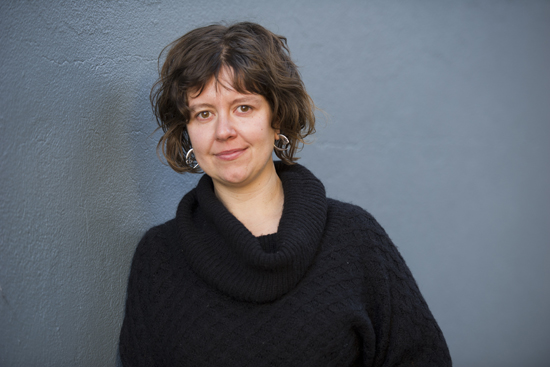Former edX Program Manager to Help Direct BU’s Online Education
Will guide University's development of MOOCs

“I want to collaborate, and use digital learning to innovatively move BU forward,” says Romy Ruukel, the new associate director of BU’s Digital Learning Initiative. Photo by Cydney Scott
A former program manager at edX, the online learning network founded by Harvard and MIT and now including BU and 28 other schools, is now associate director of BU’s Digital Learning Initiative. In her new job, Romy Ruukel is helping to shape BU’s expansion in the rapidly evolving field of digital learning.
“I’d been at edX for a year,” says Ruukel, who started at BU last month. “I enjoyed it, but I’m excited to move closer to the teaching and learning that takes place in a university setting.”
DLI director Chrysanthos Dellarocas, a School of Management professor, describes Ruukel as the ideal person for the job, in part because of her previous experience working at edX. But it’s not only that, he says. “Romy brings a fantastic energy and a passion for learning. We’re thrilled to have her on board.”
Before her career in online education, Ruukel worked in the education field for 14 years, as a research assistant at the Harvard School of Education’s Project Zero, a group that studies various aspects of learning; as an admissions representative; and as an elementary school teacher, among other things. At edX, she helped colleges such as the University of California, Berkeley, Wellesley College, and Georgetown University to develop MOOCs (massive online open courses).
Currently edX offers 93 MOOCs, which are free and open to anyone. They range from an introductory class on human evolution to one that explores fad diets and foodborne illnesses.
BU’s DLI, which launched in July, was the first recommendation made by the Council on Educational Technology & Learning Innovation (CETLI), a group formed by President Robert A. Brown to refine BU’s online education. As DLI associate director, Ruukel will shepherd BU’s relationship with edX, help to administer seed grants to faculty to craft online education specifically for BU students, and work with faculty as they design MOOCs.
As an edX member, BU is committed to the development of at least five MOOCs. The University is currently working on The Sounds of Poetry, with Robert Pinsky, a College of Arts & Sciences professor of English and three-time US poet laureate; Alien Worlds, with Andrew West, a CAS assistant professor of astronomy; War for the Greater Middle East, with Andrew Bacevich, a CAS professor of international relations and history; Baseball Analytics, with Andy Andres, a College of General Studies senior lecturer in natural science; and a yet-to-be-named course. Those courses will launch between late spring and fall 2014.
Dellarocas compares creating a MOOC with producing a movie, because both require a strong vision and a knowledgeable team. A typical MOOC team will include a faculty member, a teaching assistant, a videographer, a graphic designer, an instructional designer, and a programmer. “It’s Romy’s job to act as a program manager,” Dellarocas says, “to put together these teams for every MOOC we create and make sure the project gets done on schedule.”
Ruukel says the diversity of a MOOC’s potential audience is a real opportunity, because it can give educators insight and data on how different people learn. By studying data collected from students of different ages and demographics, “we can see not only what learners learn online, but how they learn online,” she says.
Much of Ruukel’s job entails helping faculty translate a traditional classroom lesson into an effective MOOC. “We will keep in mind the ways we are delivering the content,” she says, “because there are questions about how particular content is best delivered, based on the subject matter and the class. Content delivery might depend on whether it’s an anthropology class or a physics course, for example. We can see how long an average student spends looking at video content. How do they perform on tests if they only watched videos, or if they only read class texts? How do they do in combination?”
That collaboration with faculty is something that Ruukel is looking forward to, she says, because it gives her a glimpse into how college faculty approach teaching.
“I’m interested to see how digital learning is being used across campus and what other opportunities there are for integrated technologies at the University,” she says. “I want to collaborate, and use digital learning to innovatively move BU forward.”

Comments & Discussion
Boston University moderates comments to facilitate an informed, substantive, civil conversation. Abusive, profane, self-promotional, misleading, incoherent or off-topic comments will be rejected. Moderators are staffed during regular business hours (EST) and can only accept comments written in English. Statistics or facts must include a citation or a link to the citation.